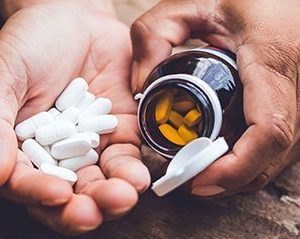- Could Your Grocery Store Meat Be Causing Recurring UTIs?
- Are You Making This Expensive Thermostat Error This Winter?
- Recognizing the Signs of Hypothyroidism
- 10 Strategies to Overcome Insomnia
- Could Artificial Sweeteners Be Aging the Brain Faster?
- Techniques for Soothing Your Nervous System
- Does the Water in Your House Smell Funny? Here’s Why
- Can a Daily Dose of Apple Cider Vinegar Actually Aid Weight Loss?
- 6 Health Beverages That Can Actually Spike Your Blood Sugar
- Treatment Options for Social Anxiety Disorder
Vitamin D Supplements Won’t Shield You From COVID-19, Studies Find

While vitamin D got some attention early in the pandemic, it does not reduce the risk of either COVID-19 or other respiratory infections, two new clinical trials found.
Both studies, one done in the United Kingdom and the other in Norway, found that boosting levels of vitamin D in adults during the pandemic didn’t help protect against respiratory viruses, even though byproducts from the vitamin have long been noted for their support of immune responses to viruses and bacteria.
In the British trial, researchers included 6,200 people aged 16 and older who weren’t taking vitamin D supplements at the start of the study.
About half of the participants were tested for vitamin D levels as the trial began. About 86% of those had low levels and were given either 3,200 IU/day or 800 IU/day of vitamin D supplements for six months. The remaining trial participants were not tested or supplemented.
Regardless of dose, the investigators saw no difference in diagnosed acute respiratory tract infections or confirmed COVID-19 cases. Adverse events were similar between the groups.
The trial in Norway included over 34,700 adults who were not supplementing with vitamin D. The participants were given either a placebo daily for six months or 5 milliliters of cod liver oil, which contains low doses of vitamin D, vitamin A and omega-3 fatty acids.
Those researchers also found no effect on acute respiratory infections or confirmed COVID-19 cases.
Strengths of the trials included using PCR tests to confirm COVID-19 infections and high levels of compliance among participants.
Limitations were that in the British trial, participants who were taking vitamin D knew it and about half of the control group took a vitamin D supplement on at least one occasion during the trial. In Norway, limitations were that participants were young, healthy and those tested started the trial with adequate vitamin D levels.
Both studies were published online Sept. 7 in the BMJ.
During the time that both trials were conducted, vaccines were rolled out in those countries. In an editorial that accompanied the research, Peter Bergman, a professor at the Karolinska Institute in Sweden, said vaccination is still the best way to protect people from COVID-19.
Vitamin D and cod liver oil supplementation should not be offered to healthy people with normal vitamin D levels, Bergman said in a journal news release. Clinicians could instead focus on high-risk groups, he said, including people with dark skin, or skin that is rarely exposed to the sun, pregnant women, and elderly people with chronic diseases.
More information
The U.S. National Institutes of Health has more on vitamin D.
SOURCE: BMJ, news release, Sept. 7, 2022
Source: HealthDay
Copyright © 2026 HealthDay. All rights reserved.










